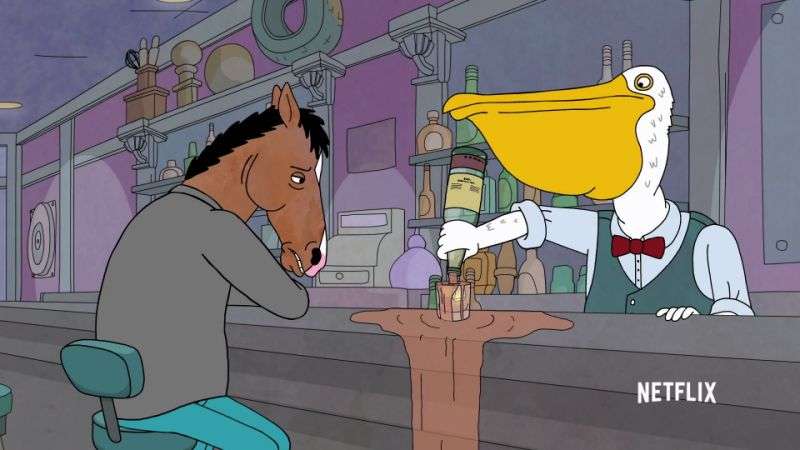The Marketing of Depression
Beware: this article contains spoilers
I’ve been watching Bojack Horseman since the beginning of 2018, and I’ve been hooked ever since. The adult cartoon uses irony, metaphors, cinematography, among other literary devices, to not only demonstrate but also start a conversation about current taboo topics. Above all, the truth about how we deal with them. The series follows the story of Bojack Horseman, an American humanoid-horse who is an actor and used to be famous for starring in a television show. The viewer dives into multiple aspects of his identity while deciphering piece by piece the roots of his trauma: addiction, depression, and anxiety. Other protagonists also face issues such as sexism, economic disparity, and body image. The show captivates the audience with its use of comedy to tackle such topics while also making statements about them. The first half of its latest season, which came out in October, delivers what seems to be the final product of Bojack’s character development across the seasons. However, there are still parts of him that could be “improved,” but seeing as he is meant to be far from that as to represent any human with seemingly unsolvable issues, as we all are. It also considers, more specifically, how people perceive depression and its effects on the treatment of that mental illness. The show is a beacon for invoking action based upon the unjust manner these issues are currently dealt with in the real world. One of them being how depression seems to be treated like a joke that can be “cured” easily through how it’s marketed to the public, especially in the United States.
In my Portuguese class, we’ve recently looked at how health campaigns created and divulged by the government have an immense impact on the actions individuals take towards their well-being. We’ve discussed how easily public opinion can be manipulated through the use of appeals to emotion, appeals to logic, putting the responsibility of getting help on the individual, enforcing one’s societal roles (such as being a standard mother), and more. This means that just by changing a single thing it can change one’s entire perspective on the issue, even if it’s as simple as the color of one’s shirt.
Which is why all of the above makes me wonder: is the marketing of depression truly an honest, effective manner to help those diagnosed with such illness get help or is it solely an evil scheme corporations have come up with to make money out of people’s vulnerabilities? This is an incredibly hard question to evaluate, especially since we cannot know people’s true intentions or conduct a study that takes all possible factors into account including bias. However, what can be done is examining what the show’s creators seem to think. The same tactics used in government health campaigns to manipulate the public are present in how Mr.Peanutbutter, one of Bojack Horseman’s protagonists who is a dog, partners up with a national teen sensation to be recognized as “the face of depression.”
On the seventh episode of the sixth season, Bojack embarks on a journey to reconnect with those he lost contact with because of his issues and self-destruction. While Mr.Peanutbutter, a character who does not demonstrate any signs of having depression, is chosen as the national face for depression. Since Mr.Peanutbutter has a narcissistic personality disorder, runs away from his problems, and is not self-aware, there is a possibility he could be in denial about his own depression. After a meme spreads where he is represented as a “Sad Dog”, Princess Carolyn, his agent, spreads the idea that he attempted suicide, gaining him popularity. With his problematic nature and Joey Pogo, a national teen pop sensation, he says yes. In this season, as it finally seems that Bojack is getting the help he needs by going to rehab, Mr.Peanutbutter seems to be spinning out of reality. He creates an advertisement where a fly-person with a sad expression is shown along with a dark blue, rainy sky. Then, Mr.Peanutbutter pops up and asks the camera “What is depression? Who is depression? Where is depression?”, and ultimately explains nothing about the topic. He then says “If you relate to any of these words, you might have depression”.
This ironic commentary explores how, in the media, mental illnesses have a stigma behind them and are not accurately represented. Sometimes, they go as far as to make a joke out of the illness. Bojack, the character who truly suffers from depression went through years of alcoholism and opioid addiction to finally get the help he needed. Meanwhile, the internet was so fast to popularize a shocking event of Mr.Peanutbutter’s attempted suicide that wasn’t even true. Even creating a campaign to “fight against depression” by saying random ideas that are not informative. Unfortunately, these actions make people start to spin lies about mental illnesses and promote ways to work through them that aren’t valid. This show truly deals with mental illnesses and brings out the reality of how hard it is for someone to admit they have a problem and seek out the help they need. This is made an even more challenging task when the media puts out campaigns and advertisements to tell people that all they need is a little pill, when that is highly unrealistic for people who suffer from these issues.
On the other hand, there are also organizations such as the World Health Organization and the National Institutes of Health of the United States that truly bring awareness to issues like these and get people the help they need. Another example would be the Mayo Clinic, a major medical institute that not only researches and treats people for their medical problems but also spreads awareness about the true effects of illnesses such as depression. We need to remind ourselves that while there may be people out there looking for an easy way to make money by taking advantage of people’s vulnerabilities, there are also people out there genuinely looking to help others. It’s just a matter of being able to see through manipulation and knowing who to trust.
Source: World Health Organization, etc.

Isa is a sophomore at school, but a freshie at The Talon. She is a writer for the Features section and loves to poke at controversial topics. She's very...










